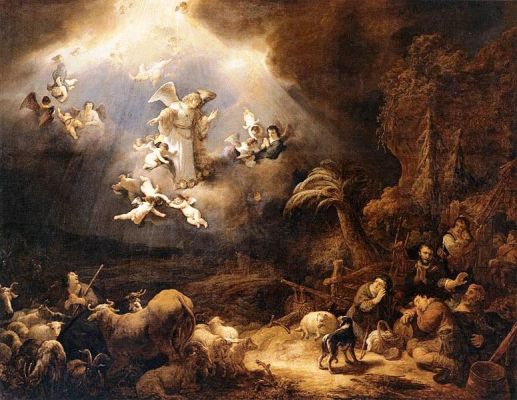 |
| "Angels Announcing the Birth of Christ..." (G. Flinck) |
In the last posting in this series on reading the Christmas stories from a progressive Christian perspective, I introduced the idea of levels of biblical interpretation, based on Kugel's book, How to Read the Bible (Free Press, 2007). To his three levels, I added a fourth, which is a combination of discovering the original intent of biblical texts but not being too wedded to that intent.
Take for example, the fact that this story of the shepherds and angels starts with the shepherds. It then introduces the heavenly agent in the story, the angels. The beginning point, however, is earthly rather than heavenly. Is there a hint here, or can we make a hint out of this story's beginning point?
Christian theology, very broadly speaking, can take one of two orientations, earthly or heavenly. An earthly orientation begins with the human condition and works from that condition to God. Volume I of an earthly systematic theology is "Creation," and the author of such a theology doesn't consider the Creator until later on. A heavenly-oriented theology starts off with God and the concept of the Trinity and only later looks at the place of humanity in the divine scheme of things.
So, to ask again, is the fact that the story of the shepherds & angels starts with the shepherds rather than the angels a hint? Does it suggest that the earthly approach is preferable? Could be—if we want it to be. When we consider that the Gospel of Luke begins with earthy stories about conceptions, pregnancies, and births and that the whole of the gospel focuses on earthly issues and events—well, maybe the proper starting point for our theological reflections is the human condition. In fact, the Incarnation doesn't make much sense unless we begin with the earthly situation that requires heavenly intervention. In theology, the starting point is no small matter. Where one begins in Volume I shapes everything else.
But that's not my main point here. My main point is that we can gain insights from this story that have little to do with the original intent of the author of the Gospel of Luke—in so far as we can even guess at that original intent. In Kugel's schema, level one is the original intent of the biblical author (or storyteller); level two is ancient reinterpretations of the texts; and, level three is modern scholarly reconstructions of original intent. In level four, we keep in mind the scholarly reconstructions, remembering that often the scholars are guessing, but still read the text for contemporary meanings. In our day and age, the fact that the story of the shepherds & angels starts with the shepherds opens up a concern with the social sciences and the physical sciences including esp. biology. It points us to the human conditions that God addresses in Christ, including poverty, injustice, ignorance, immorality, and oppression—the conditions under which commoners lived in the first century. This has little to do with the original intent of the author. It is a modern reading, which seeks to be faithful to the story now and here.